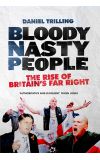
29 Oct 2012 12:44:59
In Bloody Nasty People (the pun is the Sun's), Daniel Trilling addresses these issues in a brisk but compelling narrative. The story goes like this. In 1967, a number of obscure far-right grouplets combined to form the National Front. Emboldened by Enoch Powell's 1968 "rivers of blood" speech (and the Heath government's admission of 27,000 Asians expelled from Uganda in 1972), the party was hijacked by neo-Nazi John Tyndall, who presided over an expansion of membership and votes, but no seats, in local elections in the 70s. Subject to an ideological and physical assault from the antifascist movement, and outflanked by a resurgent, rightwing conservative leadership, the Front was humiliated at the 1979 general election.
During the 80s, the Front was taken over by a racial-mystic, quasi-terrorist faction, inspired by the Italian fascist "strategy of tension" which had led to the death of 86 people in Bologna's railway station bomb of 1980. Meanwhile, Tyndall saw his new British National Party as a more traditional neo-fascist alternative. Under his plodding leadership, the BNP failed to exploit anger at the Salman Rushdie fatwa, and – facing continued antifascist action – found itself increasingly unable to organise. Forced by these circumstances to return to the ballot box, the BNP won a single council seat – under the slogan "Rights for Whites" – in Tower Hamlets in 1993.
Derek Beackon's victory was shortlived, but it provided a kind of dress rehearsal for what was to come. By 1999, Tyndall had been deposed by Cambridge graduate – and eager Holocaust-denier – Nick Griffin, who set about "modernising" the party by dropping its most obviously risible, and contemptible, policy, the compulsory repatriation of Britain's entire non-white population. Like the NF in the 70s, the Griffin BNP was double coded, providing "a sense of belonging to something very special" to its core activists, while persuading "ordinary electors" that it was "just another choice on the political scene". It was this publicly sanitised party which was able to exploit the 2001 Oldham, Burnley and Bradford riots (all of them provoked by the threat or fact of far-right assaults on Asian communities), first in the 2001 general election (in which Griffin won 16.4% of the vote in Oldham West) and then in a series of council election victories across the ex-industrial north, the Midlands, and London. By 2003 the BNP had 14 councillors, and, by 2006, 44. With a membership of over 10,000, the party won nearly a million votes in the 2009 European parliament elections, and two seats.
Despite all this, incompetent and often absent councillors combined with Griffin's bowel-shrivelling performance on Question Time to undermine the BNP's gains. In 2010, Griffin failed to unseat (or even seriously dent) Margaret Hodge in Barking, where a highly successful grassroots campaign also deprived the party of all of its 12 councillors. After Trilling finished his book, the English local elections of 2012 saw no BNP gains and six losses. There are now only three BNP councillors remaining.
Telling this tale, Trilling challenges much conventional wisdom. First, he contests the idea that the BNP is exclusively a Labour heresy (as Ukip is seen as a Eurosceptic Tory bolthole). In Burnley, the BNP's vote was targeted by activists scouring the Yellow Pages for self-employed builders, joiners and mechanics; their highest vote was in outlying, Tory-voting villages (as it was in Yorkshire; for a period, the Brontës' Haworth was represented by the BNP).
Second, Trilling questions the notion that the best way to beat the BNP is to steal its thunder. He insists that it was the empty Liberal Democrat promise to prioritise Tower Hamlets' "sons and daughters" for council housing which legitimised the BNP's rhetoric and opened the door for their short-lived 1993 victory. The party's anti-asylum campaign was helped by William Hague's anti-immigration "foreign land" speech in 2000. By giving credence to the BNP's case against "Africans" supposedly moving in on Barking social housing, he argues, Hodge contributed to the BNP's victory in the 2006 local elections. By contrast, in 2010, her campaign admitted Labour's responsibility for the root cause, the shortage of public housing for everybody.
The "fertile ground" from which the BNP reaped electoral success was ploughed not just by politicians but by the press. The early 21st century saw not just a remorseless tabloid crusade against asylum-seekers, but the Daily Telegraph's equally implacable struggle against the Macpherson report, the concept of institutional racism, and the bogey of "political correctness", all of which was echoed in the BNP's propaganda.
Finally, Trilling questions the idea that the threat has passed. The anti-fascist movement has proved highly effective in keeping the BNP vote below winning level. But the BNP still won 563,743 votes at the 2010 general election and gained a higher average vote in the constituencies it contested than in 2005. The emergence of the English Defence League – conceived by a City investment banker, a Christian fundamentalist and a former BNP activist, yet ostensibly anti-homophobic, racially plural and pro-Israel – demonstrates that even the British far right can change with the times. Polling on attitudes to immigration and multiculturalism suggests – at the very least – that the far right has not exploited its full electoral potential, even within a system notoriously unfriendly to minority parties. With a leader as effective as Le Pen père or fille, or even – merely – a leadership which doesn't issue death threats to each other during election campaigns, might not a new far-right grouping turn its back on violence and gain as much purchase as equivalent parties in continental Europe?
One answer to this question is that, for all their ideological contortions, the BNP, the EDL and their various splinters are fascists, and violence is what fascists do. The far right failed to take off as a serious electoral force in the 1970s, and it's failed again now. But that shouldn't tempt us to lower our guard.

